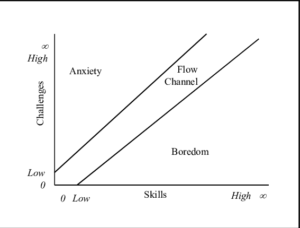
It’s Not About Pedicures
I’m quite alarmed by the way that we treat self care, both for ourselves as mental health professionals, but also for our clients. We think about self care the way we think about hunger or sleep – we let ourselves get way overstressed and then we thinking that dropping off the plane in a withdrawal state or going on a self-indulgent binge is the way to somehow repair this.
(Without dismissing the importance of the basic physical health aspects – hydration, good nutrition, regular exercise, adequate sleep…) I’d like to propose a way of thinking about self care that is largely grounded in Csikszentmihalyi’s concept of Flow. The short explanation of Flow, if you’re not familiar with it, is that “zone” we get into when we’re involved in an activity that is just the right balance of challenge with our skills. It’s a balance, because if we’re engaged in things that are too easy, we get bored. If we’re engaged in things that are too difficult, we get stressed/anxious. If you’ve been in that zone, you know what I mean. In that zone, you don’t really run out of energy – the energy just seems to self-replenish.

I believe in our clinical work, we often get ourselves (or find ourselves) out of balance.
We take on too much – too many clients, too long of days, clients who are legitimately outside our boundaries of competence but we don’t want to admit it, expecting to have the same therapy-stamina as the most productive person in the office.
Or we take on too little – get into a therapeutic rut and don’t challenge ourselves to build new skills, we are in an overly systematized job and function as automatons rather than clinicians.
Sometimes, it’s that we feel we have no control – we’ve given up our autonomy to a harsh internship director for the sake of getting hours (oh, how you’ll regret this!), we’re so burdened by rules and paperwork that our actual clinical work is only a handful of minutes per hour or day.
And sometimes, it’s that we know the work isn’t meaningful – we can see that clients aren’t improving, our setting won’t allow for the care clients need, etc.
Real talk: if you are exhausted at the end of a perfect clinical day – engaging, moderately challenging clients with a diversity of experiences and concerns who you can have some degree of independence in working with – this might not be your calling. But I’d say that’s probably not most of us. And once you become aware of the ways your clinical work is pulling you out of Flow, you can begin to correct it!
Comment, please: Which way do you find yourself leaning out of Flow? How can you see this also working in clients’ lives?
